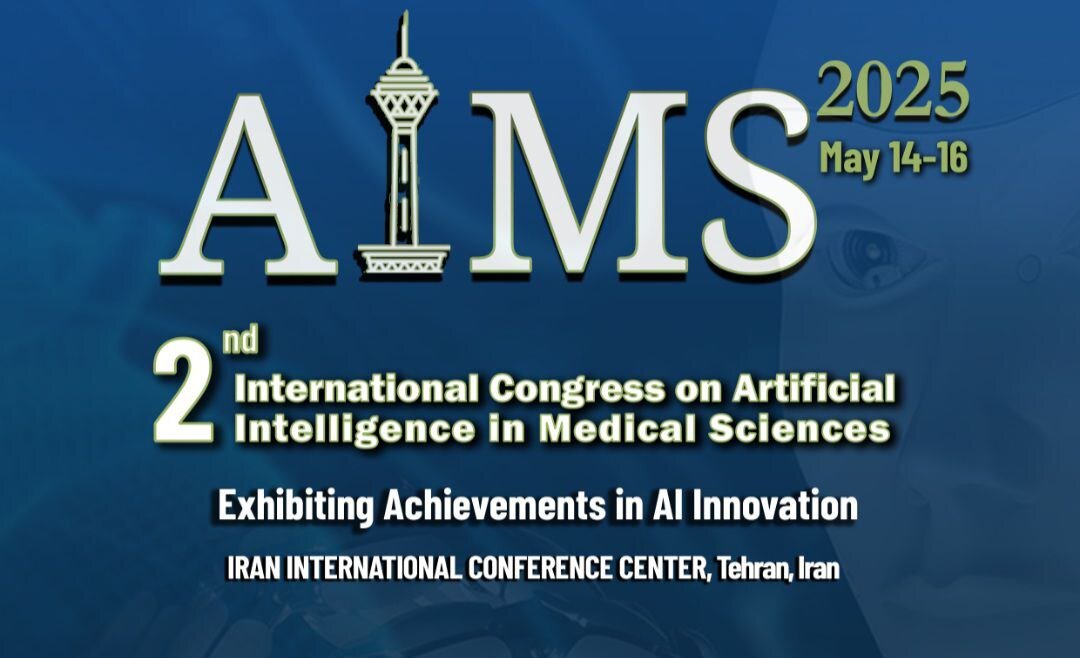2nd Intl. Congress on AI in Medical Science to be held in May

TEHRAN – The 2nd International Congress on Artificial Intelligence in Medical Science (AIMS) is scheduled to be held in Tehran from May 14 to 16.
The event serves as a platform for exchanging expertise and ideas and establishing international collaborations among researchers and experts interested in the application of AI in the medical industry to conduct joint research projects using AI technologies.
The main objective of the congress is to facilitate interaction between researchers and those interested in AI, allowing them to share their knowledge and experiences while discussing the latest achievements, challenges, and emerging trends in the area.
Additionally, the congress will offer a unique opportunity to identify weaknesses and key challenges facing the development of AI in medical sciences.
The congress will also focus on the exploration of new opportunities in various areas, such as the diagnosis and treatment of diseases, the development of novel drugs, and the improvement of healthcare systems.
The congress will center around personalized medicine, biomedical data processing, AI in pharmacy, AI in digital health, advanced technologies and medical equipment, generative AI in health care, and health policy, law, and management in AI.
AI innovation in telehealth
On February 16, Smart University of Medical Sciences (SMUMS) will host a preliminary event, titled ‘AI innovation in telehealth’, before the second international congress of AIMS with both national and international lecturers addressing the event.
The event will showcase the latest AI tools in telehealth, and discuss the use of AI in telehealth platforms, the use of AI to enhance the patient experience, and future trends in AI and telehealth. It will also foster collaboration among healthcare professionals.
MOU signed to use AI in medical treatment
In January, the Vice Presidency for Science and Technology and Tehran University of Medical Sciences signed a memorandum of understanding to use artificial intelligence for medical treatment purposes.
The agreement aims to promote the targeted support of the knowledge-based ecosystem in the field of health with a focus on omics and genomics studies, cell therapy in endocrinology and metabolism, person-centered medicine with artificial intelligence tools for prevention, prediction, diagnosis, and treatment, and finally innovation in the commercialization of products and services, ISNA reported.
Statistics have shown noticeable cost savings, about 40 percent, using artificial intelligence in health in advanced countries. In some specific cases, like breast or lung cancers, artificial intelligence can lower healthcare costs by 80 percent, hence knowledge-based economy should aim to utilize AI to save healthcare costs, IRIB quoted Mostafa Qaemi, the secretary of the Biology Development Headquarters, as saying.
“Smart University of Medical Sciences has compiled a smart healthcare document, which is currently in the final stages of approval.
Once approved, the document is a valuable step taken towards digital transformation in the country’s healthcare system,” Hassan Bakhtiari, the SMUMS president, said in December 2024.
The SMUMS research center is a suitable place for conducting applied research and recruiting medical researchers. The center can also help develop treatment and reduce treatment costs, he noted.
Highlighting that most of the regional countries are pioneers in artificial intelligence, he said: “Iran needs to strengthen its position in the artificial intelligence sector in the region.”
AI plays a key role in the diagnosis, prevention, and treatment of diseases. It also improves the quality of medical services.
Bakhtiari went on to say that by using AI technology, the development of medical services in disadvantaged and rural areas can be put on the agenda.
Telemedicine is one of the areas in which AI can help establish health justice by providing access to advanced medical services in remote areas, he added.
MT/MG
Leave a Comment